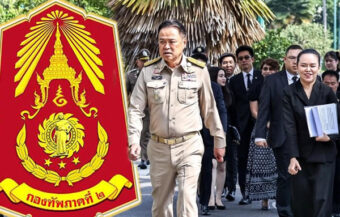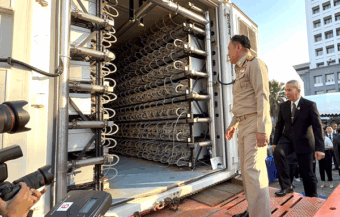Underlying figures for the economy in December 2020 were quite positive and showed recovering economic momentum despite the setback of the 2nd wave which hit domestic economic activity and consumer confidence. However, industry sources believe that the export-led improvement in outlook so clearly seen at the end of last year will continue into the early months of 2021. Even with projected foreign tourism activity cut back to an expected 5 million visitors for this year and warnings from analysts of downside risks, the prospects are also there for recovery.
On Monday, the Minister of Finance, Arkhom Termpittayapaisith, gave an assurance that Thailand and its recovering economy were in a position to withstand any eventuality as the government battles to deploy an effective vaccination programme amid a worldwide run on vaccine supplies. Mr Arkhom said not only has the kingdom adequate financial resources in place to cushion against this second wave of the virus, but it could also cope with a third wave although it might mean breaking the country’s 60% ceiling on public debt to GDP set by law.

Thailand’s Finance Minister, Arkhom indicated, on Monday, that the government was prepared to see public borrowing exceed the 60% limit prescribed by law if circumstances dictated it in the event of a third wave of the Covid-19 virus emerging before the kingdom’s vaccination programme is complete or the pandemic recedes.
Mr Arkhom also pointed out that the government has access to sufficient capital to deal with the second outbreak. He said even with the ฿1 trillion loan package dawn down, the kingdom’s finances, running on a 4-year cycle from 2022 to 2025, will not see the 60% debt ceiling breached.
Even further borrowing for a third wave would not impact financial stability says Finance Minister
Even if the country experiences a further emergency, he said that exceeding the ceiling would not pose a threat to financial stability.
At the end of 2020, the GDP to debt ratio stood at 52.1% with borrowings of ฿8.1 trillion. Mr Arkhom pointed to advanced economies and even other emerging countries who have resorted to unprecedented steps using fiscal supports to deal with the pandemic and protect their country’s economic infrastructure and prospects going forward.
Economy contracted by 6.5% last year, in line with a crisis target set by government ministers
The Bank of Thailand had estimated a GDP contraction in 2020 in the order of 6.6% and while things deteriorated at the end of December, last week, the Finance Ministry revealed better than expected export figures and other data from the third quarter when it confirmed a 6.5% contraction for the year.
In the middle of last year, the Centre for Economic Situation Administration (CESA) had, at one point, at the height of the crisis, set a target to keep this figure at under 7% and it looks like that this has been achieved.
Finance Minister Arkhom has said that even with the ฿1 trillion debt package organised by the Public Debt Management Office fully utilised, the country’s debt to GDP ratio would still only stand at 57%.
Thailand’s debt to GDP ratio compares well with other countries especially developed economies such as the United States which ended 2020 at 126%
The United States, for instance, according to the US Treasury at the end of October 2020 had over $27 trillion in public debt, that is ฿810 trillion. Figures released, just in recent days, by the US Bureau of Economic Analysis at the Department of Commerce, show that US GDP for 2020, boosted by a small gain in the last quarter, rounded out at $21.48 trillion.
This would give a debt to GDP ratio of 126% for the world’s largest economy.
The Finance Ministry, last week, downgraded its growth forecast for 2021 from 4.5% to 2.8% when it accepted that foreign tourist arrivals would be substantially lower than anticipated for the year.
Revised lower figure for foreign tourists is the downside. All depends on the vaccination campaigns in Thailand and other countries
The revised figure for foreign tourists is now 5 million visitors but even this will require unimpeded access to the kingdom in the last quarter of 2021.
This will depend on the progress of national vaccination campaigns worldwide, the path of the virus as well as Thailand’s own programme which, it is now thought, will only commence in June with any sort of capacity.
Economic picture from December’s performance is more positive and encouraging for planners
However, the picture presented by Fiscal Policy Office Acting Chief Kulaya Tantitemit last week gave cautious grounds for optimism that the Thai economy can pull through the challenge of Covid-19.
Finance Ministry officials had already accepted that the second virus outbreak had already damaged consumer confidence even in December with the index falling from 52.4 to 50.1. This has continued into January.
However, other indicators were encouraging, not least the country’s key economic generator, the export sector.
December saw a massive 15.7% rise in exports to the United States followed closely by output to Japan which gained 14.9% and Australia which rose by 13.5%. Exports to India were also up by 14.5% with smaller gains in the Chinese market which rose by just over 7%.
Exports in December 2020 were up 4.6% from the year before with a surge in shipments to the United States and also gains in Japan and Australia
Overall, exports in December 2020 were up 4.6% compared to figures for 2019 although VAT collections, a sign of domestic economic activity, were down by 4.4% which also shows an economy that had recovered from the devastation inflicted in April 2020 when the country effectively shut down causing a double-digit GDP contraction in the second quarter.
A sign of how the economy was coming back in December, before the second virus outbreak in Samut Sakhon, was a sharp rise in the sale of cars and also, very significantly, motorbikes, which rose by 16.4% and 10.5% respectively.
Join the Thai News forum, follow Thai Examiner on Facebook here
Receive all our stories as they come out on Telegram here
Further reading:
Cabinet eases the burden on struggling firms as tourism sector warns another million jobs will go
Fact – only 6,556 visitors arrived in Thailand last month compared to 3.95 million in December 2019
Desperate foreign tourism business concerns are clinging to straws as they try to survive the crisis
Challenge of the virus and closure to tourism leads to major long term changes in the Thai economy
Finance Minister says economy must pivot away from tourism with a switch to S-Curve industries
Strengthening baht predicted as investors bet on a reopening of Thailand to mass tourism in 2021
World’s biggest free trade deal just signed will be a huge boost for the Thai economy and exports
RCEP deal agreed as India opts out – busy Bangkok ASEAN summit concludes on a low key
Chinese FM to visit Thailand in a Covid battered world of raised tensions and potential conflict
Prime Minister indicates that the cabinet reshuffle will be complete very shortly with no problem
Thailand’s economy has become dependent on government expenditure to stay above water
Thailand and US aim for a new more ‘proactive’ trading relationship as ambassador meets Prayuth
Rice price spike but drought conditions to recede – security concern for the Mekong river
US suspension of Thai preferential trade partner status part of Trump’s ongoing trade war


















